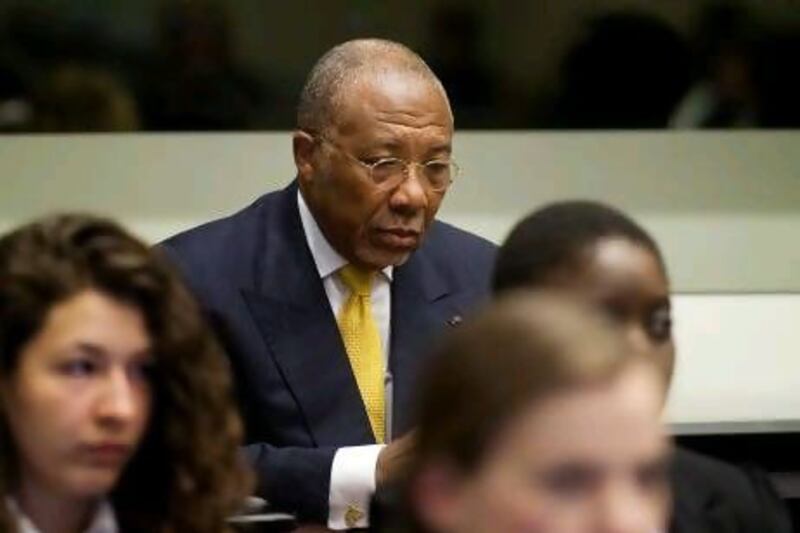LEIDSCHENDAM, NETHERLANDS // Judges sentenced Charles Taylor to 50 years in prison yesterday, saying he was responsible for "some of the most heinous and brutal crimes recorded in human history" by arming and supporting Sierra Leone rebels in return for "blood diamonds".
The former Liberian president is the first former head of state convicted by an international war crimes court since the Second World War and judges at the UN-backed court in the Netherlands said they had no precedent when deciding his sentence. Taylor, 64, was convicted last month of all 11 counts of war crimes and crimes against humanity for aiding and abetting Sierra Leone's Revolutionary United Front during the country's brutal 1991-2001 civil war.
Suzanah Vaye watched the proceedings and hailed the sentence in the Liberian capital of Monrovia. Her husband was killed during the last days of Taylor's government in 2003. He was last seen in the hands of Taylor's security force.
"Martin Luther King Jr once said that justice in one place is justice everywhere," said Mrs Vaye. "Had Taylor not been so cruel to his own people here, he would not have taken it elsewhere. Today, I join Sierra Leoneans in saying this should be a lesson to people that God has his own way of bringing judgment ... Let this be a lesson to leaders that no one is bigger than God."
Taylor will serve his sentence in a British jail. His lawyers, however, said they will appeal his convictions and that will likely keep him in a jail in The Hague, Netherlands, for months.
The prosecutor Brenda Hollis also said she was considering an appeal.
"It is important in our view that those responsible for criminal misconduct on a massive scale are not given a volume discount," Ms Hollis said.
Taylor showed no emotion as the sentence was handed down.
"The lives of many more innocent civilians in Sierra Leone were lost or destroyed as a direct result of his actions," the presiding judge Richard Lussick said.
Prosecutors had asked for an 80-year sentence. Taylor's lawyers urged judges to hand down a sentence that offered him some hope of release before he dies.
Ms Hollis said the sentence would only provide a measure of closure for victims of one of Africa's most savage conflicts.
"The sentence that was imposed today does not replace amputated limbs. It does not bring back those who were murdered," she said. "It does not heal the wounds of those who were victims of sexual violence and does not remove the permanent emotional and psychological and physical scars of those enslaved or recruited as child soldiers."
Taylor's lead attorney, Courtenay Griffiths, warned that the court's refusal to take into account Taylor's decision to step down from power following his indictment in 2003 when setting his sentence sent a worrying message against the backdrop of ongoing atrocities allegedly being committed by Syrian government forces.
"What lesson does that send to [Syrian] President [Bashar Al] Assad?" Mr Griffiths said. "Maybe the lesson is: If you are a sitting leader and the international community wants to get rid of you either you get murdered like Col [Muammar] Qaddafi, or you hang on until the bitter end. I'm not so sure that's the signal this court ought to be transmitting at this particular historical juncture."
Amputees who are still struggling to lead normal lives years after they were mutilated by the rebels backed by Taylor hailed the sentence.
"He has done bad things to us," said Sento Thoronka, 22, an amputee, as she attempted to cut weeds this weekend before the verdict using only her right arm. Her left arm was hacked off, a common terror tactic by the rebels backed by Taylor.
"There is nothing someone can say to me that will ever make me forget what he did, because when I look at myself I look odd. I'll never feel fine about that," she said.






